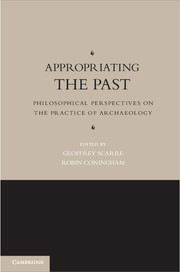Book contents
- Frontmatter
- Contents
- Contributors
- Editors
- Chapter 1 Introduction
- Part One Claiming the Past
- Chapter 2 The Values of the Past
- Chapter 3 Whose Past? Archaeological Knowledge, Community Knowledge, and the Embracing of Conflict
- Chapter 4 The Past People Want
- Chapter 5 The Ethics of Repatriation
- Chapter 6 On Archaeological Ethics and Letting Go
- Chapter 7 Hintang and the Dilemma of Benevolence
- Part Two Problems of Meaning and Method
- Part Three Problems of Ownership and Control
- References
- Index
Chapter 4 - The Past People Want
Heritage for the Majority?
Published online by Cambridge University Press: 05 December 2012
- Frontmatter
- Contents
- Contributors
- Editors
- Chapter 1 Introduction
- Part One Claiming the Past
- Chapter 2 The Values of the Past
- Chapter 3 Whose Past? Archaeological Knowledge, Community Knowledge, and the Embracing of Conflict
- Chapter 4 The Past People Want
- Chapter 5 The Ethics of Repatriation
- Chapter 6 On Archaeological Ethics and Letting Go
- Chapter 7 Hintang and the Dilemma of Benevolence
- Part Two Problems of Meaning and Method
- Part Three Problems of Ownership and Control
- References
- Index
Summary
Archaeologists are often very disappointed when the past portrayed and evoked in our daily lives appears to derive from contemporary clichés and other imaginary preconceptions rather than accurate scholarship about past realities. This is understandable to the extent that the role of the archaeological scholar is defined as re-creating past life as accurately as possible from the traces that remain today. What is the purpose of their research, such archaeologists are asking themselves, when far too many contemporaries are satisfied by reconfirming those ever-same stereotypes about, for example, the primitive Stone Age and the pillaging Vikings?
In this chapter, however, I wish to argue that archaeology should not be concerned with assessing to what extent the past portrayed or evoked in our daily lives may or may not be historically accurate on scholarly grounds. Instead, archaeologists ought to be engaging with the overall role the past plays in present society. In that view, the role of the archaeological scholar is defined in relation to a past that derives from particular social practices in the present – of which academic archaeology itself is one. Therefore, archaeologists will need to give considerable attention to larger social, political, and indeed ethical issues. Ironically, in certain circumstances popular depictions of a past that never happened may have significant benefits for present society and would thus be preferable to those that, according to current scholarship, may historically be more accurate.
- Type
- Chapter
- Information
- Appropriating the PastPhilosophical Perspectives on the Practice of Archaeology, pp. 63 - 81Publisher: Cambridge University PressPrint publication year: 2012
- 2
- Cited by



